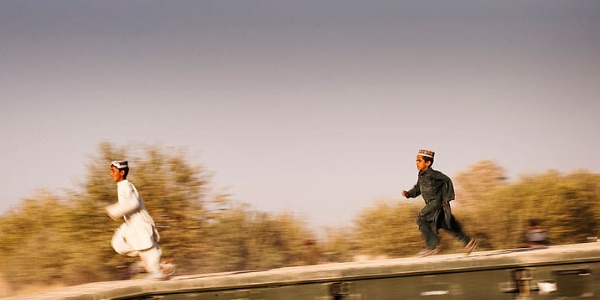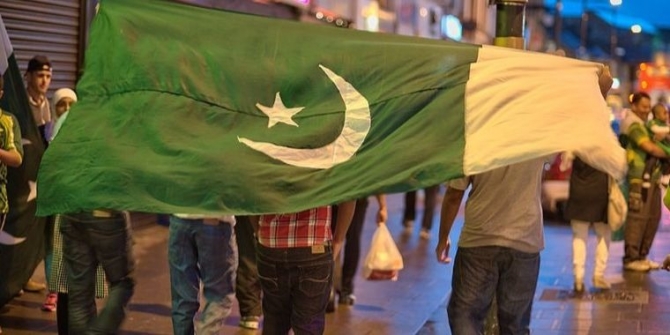
The war in Afghanistan has led to a resurgence in the practice of bacha bazi, or ‘boy play’ in Afghanistan. Sayed Jalal Shajjan discusses the inefficacy of allied and local forces in stamping out this abusive practice, as well as their complicity in its existence today.
Since the fall of Taliban regime in 2001, the international community supported the Afghan Government in addressing vital issues in post-conflict state-building such as female empowerment and elimination of violence against women, poverty alleviation, freedom of media, education and so on. However, the same cannot be said of the continuing practice ‘Bacha Bazi’ (‘boy play’).
The history of Bacha Bazi and its survival today
Bacha Bazi can be identified as contemporary child sex slavery, endangering the lives of vulnerable young boys. This practices furthermore constitutes a significant portion of human rights violations within Afghanistan. Whereas, it does leave the young boys mostly with little or no skill to pursue a meaningful life. In fact, dancing is the only skill most of the young boys caught up in the business will have for the rest of their life.
The Bacha Bazi practice remains one of the issues much talked about (in news article and documentaries). However, it has not been dealt with effectively enough to root it out from the society. Bacha Bazi exists as a sexual companionship between powerful men and their conscripts (young boys). Nonetheless, it has matured more inexhaustibly since 2001. The issue has been largely ignored by international partners, in a bid to keep their local allies (Militias) intact to fight the Taliban.
The Bacha Bazi highlights a system of gender issues in Afghanistan. Although rural culture in Afghanistan remains to a large extent, misogynistic and male-dominated, illiteracy and poverty also play their role in pushing young boys into sexual enslavement. Adolescent boys have become sex slaves and an object of lustful romance for some of the most influential men in Afghanistan. These teenage boys are often kept in sexual relationships with older men. Usually, they are bought or, in some instances, kidnapped or acquired as an apprentice from their families. The poverty-stricken families sell or send their sons to the service of such chiefs.
The young boys are then forced to sell their bodies and their dancing skills to meet the economic needs of their families. The families left to the mercy of such patrons allow their sons to provide the services without knowing they will be stripped of their masculine identity. These boys are often dressed as females, wear makeup, and dance for parties of men, and subsequently, they are compelled to engage in sexual acts.

Boys running across a bridge in Helmand Province, Afghanistan. Image credit: IASF Public Affairs Office CC BY 2.0.
The Bacha Bazi phenomenon is of frequent occurrence across Afghanistan, and it has become an outrageously common practice in the recent years. There are several factors contributing Bacha Bazi wide spread practice, but it is assumed that the non-existence any specific law to eliminate the practice, as well as government and International Forces appeasing policy with the Militia leaders has exacerbated it. Therefore, the practice remains common among some of the big man and militia leaders who keep these male conscripts, for their servitude and sexual pleasure, which is also often considered as a symbol of power and social status.
The Bacha Bazi practice remained outlawed under the Taliban rule, and death remained the punishment for the culprits. Initially, the Taliban movement started to fight local commanders involved in Bacha Bazi, highway robbery and so on. The Times newspaper highlighted in the article “Kandahar Comes out of the Closet” in 2002, one of the original escalations for the Taliban’s rise to power in the early 1990s was their unacceptability of Bacha Bazi practice. In areas under the Taliban control, Bacha Bazi became taboo, and men involved in the practice had to go underground and keep the practice in secret.
Some have debated that even within the Taliban, the tradition of Halekon (in Pashto means boy) was persistent. Although publicly debarred, the isolation of the boys from their families exposed them further to sexual objectification and abuse while serving in fighting groups. A Los Angeles Times article stated many accuse the Taliban of hypocrisy on the issue of homosexuality. ‘The Taliban had Halekon, but they kept it secret,” says one anti – Taliban commander, who was rumored to keep two Halekon. He further added that “they hid their Halekon in their madrasas,’ or religious schools.”
Bacha Bazi and the allied coalition in Afghanistan
Since the Taliban regime toppled in 2001 with the US intervention, the Bacha Bazi phenomenon revived in certain parts of Afghanistan. However the practice has not only been limited to strong men or warlords, but it has also penetrated the Afghan Police Forces. The US Special Inspector General for Afghanistan in a recent report sharply criticized the Afghan Government for remaining complicit for not preventing the recruitment and sexual exploitation of children by the Afghan National Army.
Recently, a short video circulated on social media displaying Police Chief of Ghormach district of Faryab province of Afghanistan kissing a teenage boy. It highlights the depth of Bacha Bazi’s shameful practice in Afghanistan. A former Marine recalled feeling sickened the day he entered a room on a base and saw three or four men lying on the floor with children between them. “I’m not a hundred percent sure what was happening under the sheet, but I have a pretty good idea of what was going on,” he said. In a New York Times article Lance Cpl. Gregory Buckley Jr, told his father before he was killed on his base that “At night we can hear them (young boys) screaming, but we’re not allowed to do anything about it.” When complained to his superior, he was told, “to look the other way because it’s their culture.”
In response to the military policy of “look the other way” the spokesman for the American Command in Afghanistan, Col. Brian Tribus, told the New York Times “Generally, allegations of child sexual abuse by Afghan military or police personnel would be a matter of domestic Afghan criminal law.” For international forces “the bigger picture was fighting the Taliban,” “It wasn’t to stop molestation.”
However, the American policy of treating child sexual abuse as a “cultural issue” shows the naivety of the US policymakers in Afghanistan. It is unacceptable morally and culturally to the majority of people in Afghanistan. So the question arises, what has ‘culture’ got to do with such practice? While moral values can be personal, cultural values belong to a specific assemblage of people. Morally, the practice is acceptable only to the people who are in a position to practice. Cultural values belonging to a specific group, deal with “knowledge, art, belief and any other capabilities and habits acquired by man as a member of society.” The majority of people as per their belief reject the practice and deem it un-Islamic. Those practicing it have acquired the social status of being a Militia leader or a big man during the years of conflict. With the absence of Law and Order apparatus, they found themselves untouchable. The US Forces strengthen them furthermore by enlisting them as their allies in the fight against the Taliban and by ignoring their human right abuses.
The revised Criminal Code
The practice of Bacha Bazi exacerbated with the absence of the rule of law, a weak justice system, and unwillingness of International Community to fight it out. Afghanistan’s justice system remained lacking defined laws on the practice of Bacha Bazi until recently.
In the absence of legal mechanisms specifically defined for the Bacha Bazi, the perpetrators have enjoyed the freedom to practice this crime. Nonetheless, to suppress the practice, the Afghan government recently revised the penal code. In an entire chapter dedicated to criminalizing the practice of Bacha Bazi in the new Penal Code, the perpetrators of the Bacha Bazi could face up to seven years in jail while those keep multiple boys below age 12 could face life imprisonment. The chapter Five of Criminal Code of Afghanistan consists of 15 Articles criminalizes not only the practice of Bacha Bazi but also the participation in the events organized to enjoy while the Bacha’s are dancing. The article 660th of chapter five also details the punishment for the authorities of the Afghanistan National Security forces, involved in the practice of Bacha Bazi could face average punishment of up to 15 years. The revised version published on 15th May 2017 in the Official Gazette of the Ministry of Justice of Afghanistan, and thus will be enforced in January 2018.
To end this shameful practice of Bacha Bazi the confluence of law, and its enforcement will play a major role in eliminating it from society. Although there is a substantive difference between the previous Afghanistan Penal Code and the will be enacted one. While the now Criminal Code criminalizes the practice of Bacha Bazi and it is a welcome move. However, the successful implementation of the revised Penal Code will be up to the judiciary and the law enforcing authorities to utilize it put an end to this practice fully.
This article gives the views of the authors, and not the position of the South Asia @ LSE blog, nor of the London School of Economics. Please read our comments policy before posting.
About the Author
 Sayed Jalal Shajjan is a development practitioner based in Kabul focusing on social and economic development, migration, peace, and terrorism. He holds an MSc degree in Anthropology and Development from the London School of Economics and Political Science and can be followed on twitter @jsaeedsh.
Sayed Jalal Shajjan is a development practitioner based in Kabul focusing on social and economic development, migration, peace, and terrorism. He holds an MSc degree in Anthropology and Development from the London School of Economics and Political Science and can be followed on twitter @jsaeedsh.







